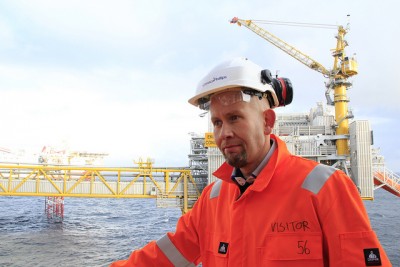Tord Lien, Norway’s government minister for oil and energy, isn’t letting himself be overly concerned by the recent, some say dramatic, fall in oil prices. Lien believes oil companies will continue to be interested in tapping into Norway’s large oil reserves, and that there are still large amounts of oil and gas off Norway just waiting to be found.

“The oil age is not over,” Lien stressed in a speech to the country’s largest labour union representing oil and industrial workers, Industri Energi, just before meeting with foreign correspondents in Norway.
Lien, from the conservative Progress Party that shares government power with Norway’s Conservative Party, told the correspondents that he’s convinced fossil fuels will continue to provide most of the world’s energy for at least another 40 years. The shift to more environmentally friendly, renewable sources of energy, Lien believes, will come gradually.
Interestingly, he dwelled on the production and development of renewable energy in Norway (which mostly comes from its hydroelectric resources) as the “first pillar” of his ministry’s responsibilities. He spoke warmly of Norway’s ability to generate electricity from its waterfalls and the need to build more export capacity, such as through the undersea cables recently announced to Germany and Great Britain. “We have to build power lines,” Lien said of the cables and overhead lines that also have drawn criticism. He said his ministry was also paying more attention to wind energy potential and support schemes for other renewable energy projects.

Oil and gas production, however, will remain Norway’s largest source of wealth, he said, despite the fall in oil prices from more than USD 140 at their recent peak to USD 86 earlier this week. “We know there are tremendous resources left (on the Norwegian continental shelf), also in the mature areas,” Lien said. He claimed there’s still high interest in bidding for exploration licenses, from the North Sea in the south, through the Norwegian Sea and into the Barents Sea, despite the recent fall in oil prices that can make field development unprofitable.
“It’s important for us to keep putting forth new promising acreage to the industry,” Lien said, adding later that “resources left under the seabed don’t create value for anyone.” He thus seemed to dismiss the calls of environmental groups and several political parties in opposition for doing just that: Letting more of Norway’s oil remain untapped, while turning more attention to renewable energy.
He conceded that rapidly rising costs within the oil and gas industry in recent years have now posed major challenges for the oil majors. “Rising oil prices earlier made it possible, and allowed, for the rising costs,” Lien said. Now that’s changing, and oil companies are trying to slash costs while reevaluating the viability of new projects.
Lien, who grew up in the scenic coastal area of Vesterålen in Northern Norway, still wants to see oil exploration and production in areas off both Vesterålen and Lofoten, which now is best known for its fishing resources and tourism. Lien insisted there should be no conflict between oil activity, tourism and fishing. Using the northern city of Hammerfest as as example, Lien claimed the oil industry “brings more hotels, more restaurants, more flights” that also can boost tourism, not destroy it. Lien’s government has struck a deal, however, with its two support parties in opposition to suspend the controversial issue of oil exploration off Lofoten and Vesterålen, while others hope the fall in oil prices has killed off the oil industry’s eagerness.
Lien is acutely aware of the cost-cutting and layoffs now going on in the oil industry, also in Norway, and conceded that some projects will be delayed. “But most of the (offshore) projects will be built, and the fields developed,” Lien said.
newsinenglish.no/Nina Berglund

